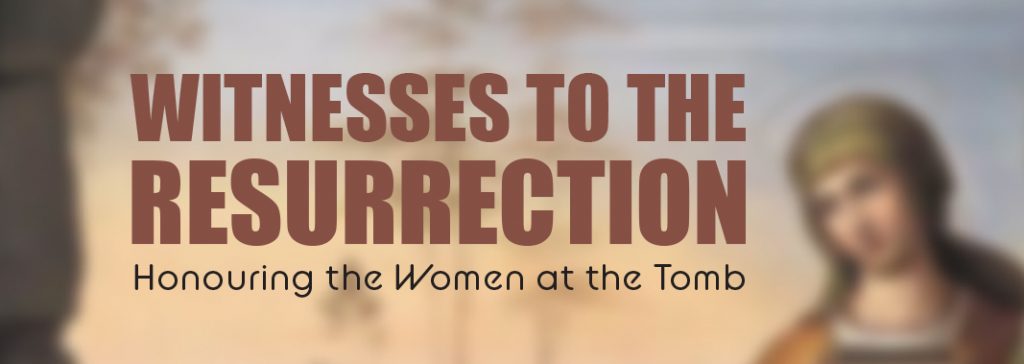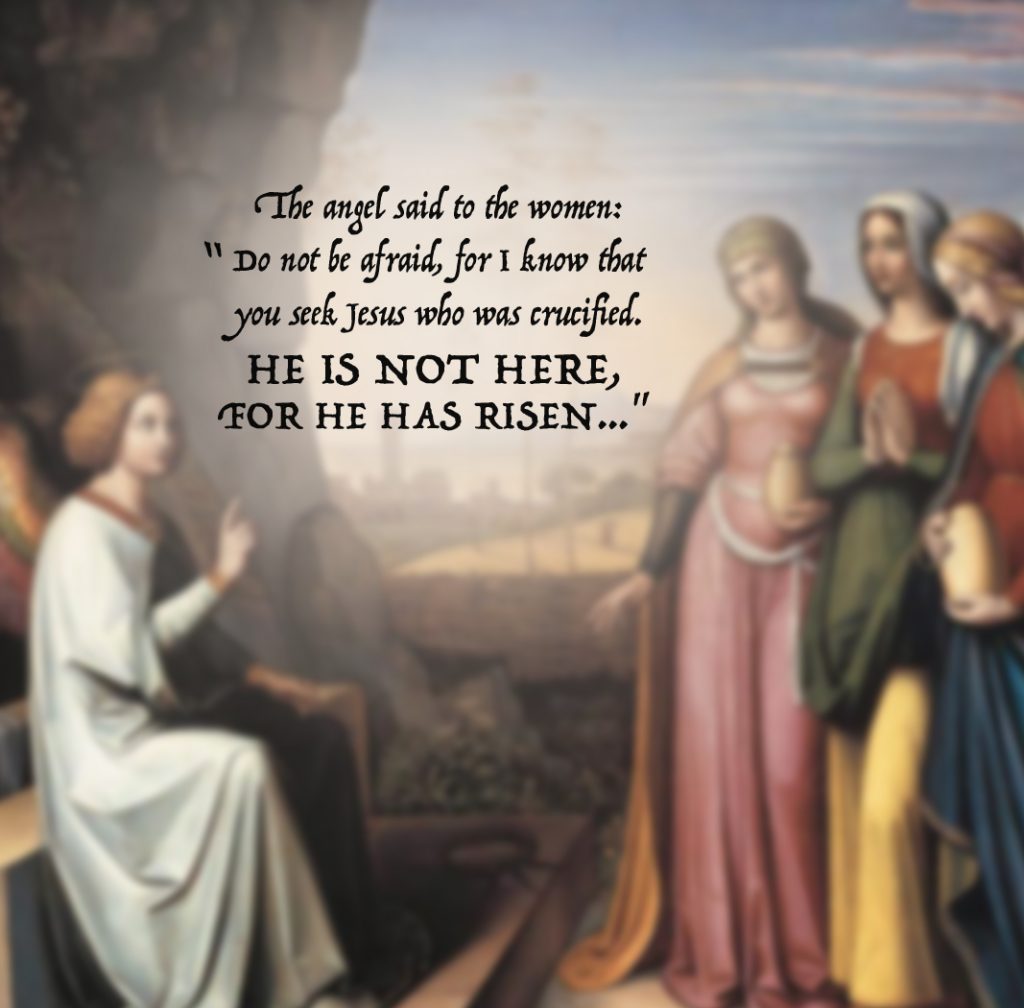Witnesses to the Resurrection: Honouring the Women at the Tomb
 by Kelly Klages
by Kelly Klages
The angel said to the women: “Do not be afraid, for I know that you seek Jesus who was crucified. He is not here, for he has risen…” (Matthew 28:5-6a)
The women at the tomb, who had come to anoint Jesus’ body after His burial, were in for the surprise of their lives. This greatest miracle of Scripture is recounted in a way that seems curiously humble, even unlikely. For those witnesses of the empty tomb, the message of angels, and finally our Lord Himself, the drama of the resurrection unfolds with both wonder and trepidation. What a great privilege and honour was granted to these women by Jesus, to be the first witnesses of the resurrection and the first messengers of the news.
How do we regard these women today, and how should we as the Church honour them? Much ink has been spilled on the significance of these women and their task—the true and the helpful, as well as the questionable and unbiblical. Our Lutheran Confessions, in the Apology of the Augsburg Confession, have a useful summary of the honours due the saints that can help us in how we think of these fascinating witnesses of the day of resurrection.
Thanksgiving
“Our Confession approves honours to the saints. For here a threefold honour is to be approved. The first is thanksgiving. For we ought to give thanks to God because He has shown examples of mercy; because He has shown that He wishes to save men; because He has given teachers or other gifts to the Church. And these gifts, as they are the greatest, should be amplified, and the saints themselves should be praised, who have faithfully used these gifts, just as Christ praises faithful businessmen” (Ap. 21:4).
All good things—the gifts and mercies of God, His plan to save us, and the news His people are given to share—are cause for thanksgiving. This is the Church’s worship of God. Our confessions warn against the worship of saints, instead encouraging that we praise their faithful use of God’s gifts and not neglect these gifts ourselves. The honour given the faithful Christian is not an end in itself, but is always meant to turn our eyes to Christ.
Thanking God for His varied gifts of grace means recognizing that each person is gifted differently. We all have many differing vocations in which to build up the Church and love our neighbour. “As each has received a gift, use it to serve one another, as good stewards of God’s varied grace” (1 Peter 4:10). The honour of confessing our faith and speaking of Jesus to others is granted to all believers. Many faithful women in Scripture engaged in loving tasks for the Christian community that are still carried out in the Church to this day, including: bringing friends to hear the words of Jesus (John 4:39), providing financial support for the apostolic ministry (Luke 8:1-3), meal preparation (John 12:2), creating garments for the needy (Acts 9:39), opening homes (Acts 16:15), training children in the Word (2 Timothy 1:5), and funeral preparation (Matthew 26:12; Mark 16:1). It was frequently in the very course of those tasks that these faithful women, including those at the crucifixion and empty tomb, ended up with a spectacular front-row seat to some of Jesus’ most powerful works and words.
If salvation from Christ’s empty tomb is before our eyes, and our response is a grudging of God’s gifts to us—if our response is anything less than worshipful thanksgiving—then we’ve missed the point.

Strengthening our Faith in God’s Mercy
“The second service is the strengthening of our faith; when we see the denial forgiven Peter, we also are encouraged to believe the more that grace truly superabounds over sin” (Ap. 21:5).
How incredibly touching are the many facets of human frailty which we read about in the Passion narrative. That mortal uncertainty, met with the comforting reassurance of Christ, continues into the accounts of the resurrection.
One of the worst takes I’ve ever seen (in the form of an internet graphic) on this resurrection passage was a roasting of the apostles for being faithless and stupid, while the women at the tomb were held up as proof of the alleged spiritual superiority of women everywhere. That kind of hubris contradicts the whole narrative—and it is notable that Jesus is conspicuous by His absence in that graphic. After all, the apostles and Gospel writers were very frank in recounting their own sins and shortcomings in the biblical accounts; and women certainly had their own moments of cluelessness too. Scripture is not written for us to speculate or brag about who among us should be accounted the greatest (Luke 9:46). It is written that we might be humble and recognize our universal fallen nature, as well as the abundant mercies of God which covers over our sins.
We have no record of the brave women at the cross and tomb heaping scorn on the apostles for their doubts, denials, and lack of faith (Luke 24:11). No, these women still recognized the authority that those apostles had, which had come from Christ Himself, and went to them swiftly with the news. In doing so, they had a unique role in the announcement of the resurrection that we still honour today.
When we see the reactions of the women and the apostles on that Easter Sunday, we become aware of the doubts and failures of Jesus’ followers and learn to take comfort in the patience and mercy of Christ to save sinners.
 Imitation of Their Faith and Works
Imitation of Their Faith and Works
“The third honour is the imitation, first, of faith, then of the other virtues, which everyone should imitate according to his calling” (Ap 21: 6).
Throughout the Gospel accounts, Jesus calls attention to the imitation-worthy faith and deeds of those who followed Him. He directs the busy (and irritated) Martha to the virtue of Mary listening at His feet to the Word. He stops in the crowd for the woman who touched the hem of His garment for healing, praising her faith. He reacts to the woman who anointed Him with expensive ointment with a promise of memory eternal for her act of love. The Church, after the pattern of Christ’s example, has designated honours and remembrances of faithful women—and the women at the tomb are among the foremost. In doing this, the Church is called to imitate. We celebrate Mary Magdalene’s festival day on July 22, while the commemoration of Joanna, Mary, and Salome falls on August 3. Even more significantly, these names are forever bound up with the greatest feast day of all, Easter itself!
In the eleventh chapter, the writer of Hebrews encourages us to imitate the faith of the saints, explaining how their faith manifested itself in their deeds as a response to God’s promises. Having said that, we saints don’t all have the same calling and vocation, and certainly aren’t called to take up just any task we want to ourselves. Our works done in faith must be in harmony with the will of God as revealed in His Word. As well-intentioned as the task of anointing Jesus’ body was, the women still waited and rested on the Sabbath in accordance with the Third Commandment (Luke 23:56). Because they rested with Christ on Holy Saturday, they were on hand to see the fulfillment of Scripture on the third day.
It is always of greatest importance, when speaking of the honours due the saints (including these faithful women), that our focus remains not merely on these fellow believers, but on the Person who is the object of their faith and ours. At the end of the day, the honours are all with Jesus.
———————
Kelly Klages is a writer and artist living in Morden, Manitoba.



